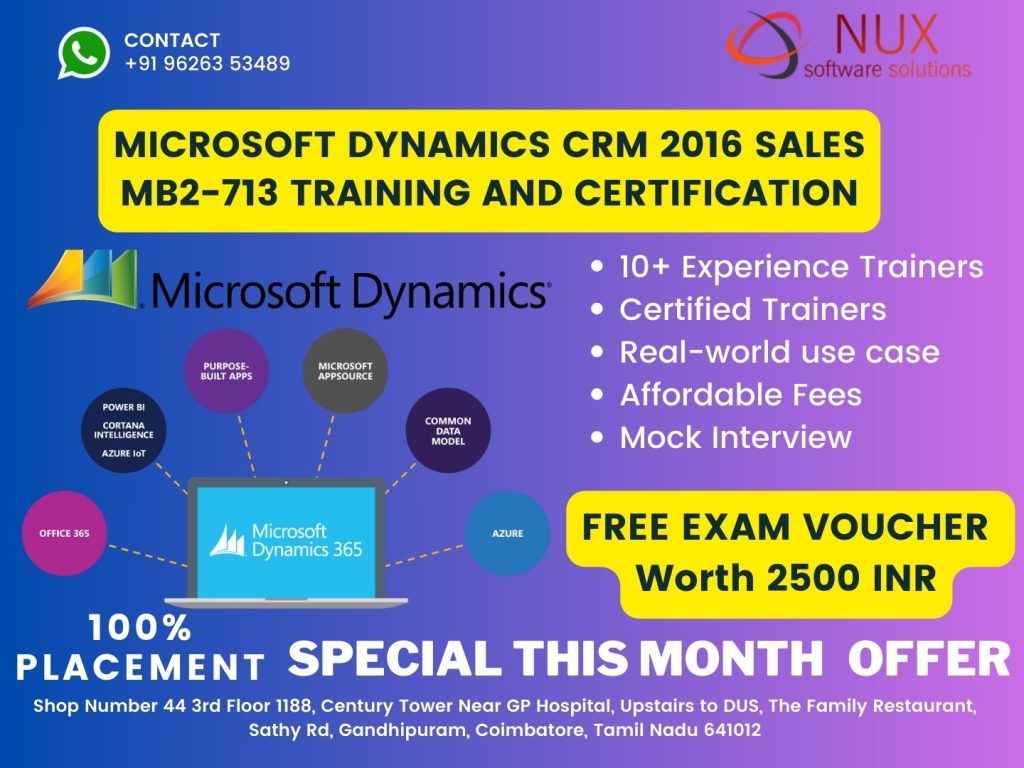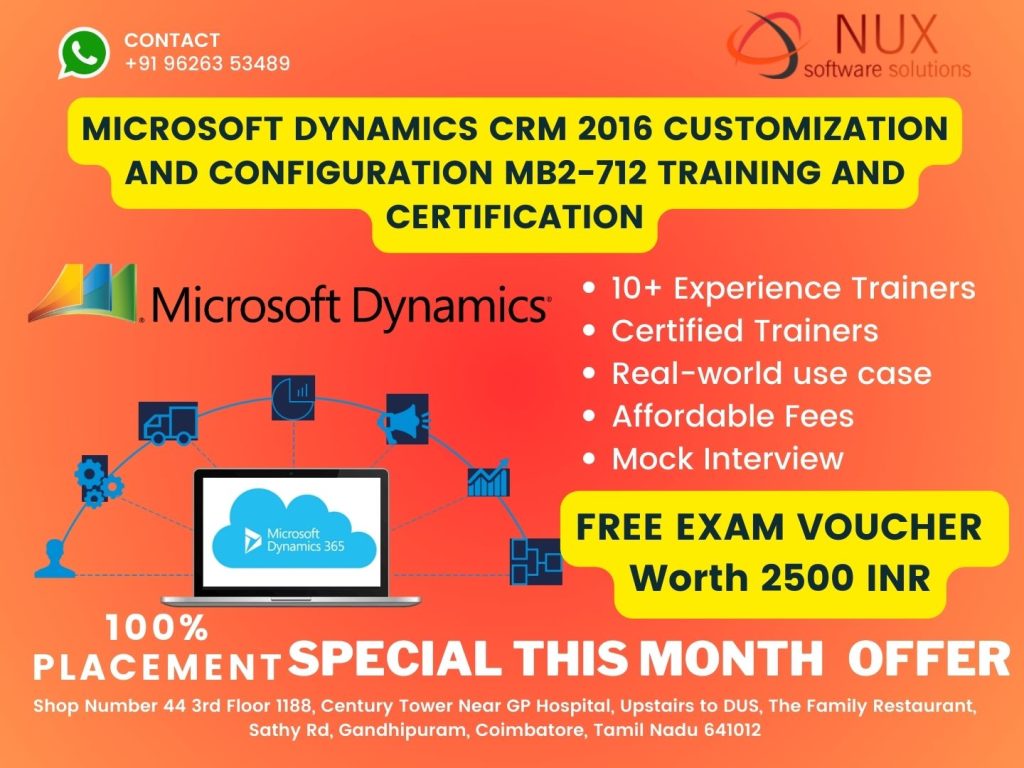Microsoft Dynamics CRM Installation MB2-708

Microsoft Dynamics CRM Installation MB2-708 Training – CRM Deployment & Administration Mastery
Course Overview
The Microsoft Dynamics CRM Installation MB2-708 Training is a specialized, certification-focused program designed to equip learners with essential skills in Dynamics CRM deployment, server configuration, security implementation, and system administration. This course is ideal for individuals aiming to become certified Dynamics CRM administrators or CRM implementation specialists managing enterprise customer relationship management systems.
Offered by Linux Training Center, Coimbatore, this program covers all Microsoft MB2-708 certification objectives while providing extensive hands-on experience with CRM server installation, configuration, troubleshooting, and maintenance, ensuring students gain both technical expertise and practical implementation skills required for professional Dynamics CRM administration roles.
Who Should Enroll?
- IT administrators seeking Microsoft Dynamics CRM specialization
- System administrators transitioning to CRM platform management
- Database administrators wanting to master CRM installation and configuration
- IT professionals pursuing Microsoft Dynamics certifications
- CRM consultants looking to enhance technical implementation skills
- Infrastructure engineers planning Dynamics CRM deployments
Why This Course Stands Out
- Complete preparation for Microsoft MB2-708 Dynamics CRM Installation certification
- Hands-on labs with real Dynamics CRM server environments and configurations
- Advanced topics covering security, performance optimization, and troubleshooting
- Integration scenarios with Active Directory, Exchange, and SharePoint
- Real-world deployment strategies for on-premises and hybrid environments
- Comprehensive coverage of backup, recovery, and maintenance procedures
- Industry best practices for scalability, security, and system monitoring
Career Roles You Can Pursue
- Dynamics CRM Administrator
- CRM Implementation Specialist
- Microsoft Dynamics Consultant
- CRM System Administrator
- Business Applications Administrator
- CRM Technical Support Specialist
- Dynamics Platform Engineer
- Customer Engagement Solutions Architect
Why Choose Linux Training Center, Coimbatore?
- Microsoft certified instructors with Dynamics CRM implementation experience
- Dedicated CRM lab environment with multiple server configurations
- Flexible training schedules: weekday, weekend, and intensive workshop options
- Official Microsoft study materials and MB2-708 exam voucher included
- Real-world projects covering installation, configuration, and troubleshooting scenarios
- Mock exams, practical assessments, and comprehensive certification preparation
- Job placement assistance with Microsoft partner companies and CRM consulting firms
- Post-training support with Microsoft Dynamics community access and ongoing guidance
Master Microsoft Dynamics CRM deployment and administration with industry-recognized certification. This specialized training opens doors to high-demand CRM administration and consulting roles in the enterprise Microsoft ecosystem.
Microsoft Dynamics CRM Installation MB2-708 Syllabus
Modules
Install and configure Microsoft Dynamics CRM (30–35%)
- Identify editions and licensing options for Microsoft Dynamics CRM on-premises; identify required and optional technologies (Active Directory, IIS, SQL Server, Microsoft SharePoint, Exchange Server, Secure Token Service); identify SharePoint, web application, and mobile device requirements; identify language and currency support; identify Microsoft Dynamics CRM server roles and role groups; Active Directory modes; explore SureStep planning
- Identify Microsoft Dynamics CRM Server hardware and software requirements and SQL Server and SQL Server Reporting Services requirements, identify components installed during server setup (folders, web components, services, Active Directory groups, SQL Server components), identify other software installed, identify IIS considerations, install required rights, perform install on a single server and multiple servers (front-end and back-end server roles), troubleshoot installation, perform post-installation tasks, install Microsoft Dynamics CRM Server by using the command line, load sample data, install language packs, uninstall Microsoft Dynamics CRM Server
- Explore SQL-based and fetch-based reports, identify installation requirements, install reporting and report authoring extensions
- Identify upgrade strategy, planning, and paths; identify components supported for upgrade and not supported for upgrade; identify Microsoft Dynamics CRM editions and versions supported for direct upgrade; plan for merging of base and extension tables; upgrade editions of Microsoft Dynamics CRM not supported for direct upgrade; upgrade other components (Email Router, Microsoft Dynamics CRM Client for Outlook)
Configure and manage Microsoft Dynamics CRM (30–35%)
- Identify deployment administrators, manage organizations (create, disable, delete, edit, and import), manage servers in the deployment, modify web addresses, identify the redeployment process and Active Directory considerations, manage Microsoft Dynamics CRM by using Windows PowerShell
- Explore the role of the Email Router; identify Email Router components and hardware and software requirements; configure supported email systems, automatic email tracking (smart-matching and tracking token), incoming and outgoing message options, and individual mailbox and forward mailbox monitoring; install the Email Router and the Rule Deployment Wizard; configure the Email Router; perform Email Router administration tasks (approve email addresses); explore supported scenarios for server-side synchronization; configure server-side synchronization
- Identify client for Outlook hardware and software requirements, identify deployment methods (manual, group policy, System Center Configuration Manager), configure Microsoft Dynamics CRM for Outlook, install by using the command line, configure offline capability, identify compatibility of Microsoft Dynamics CRM Client with Microsoft Dynamics CRM Server
Maintain and extend Microsoft Dynamics CRM deployments (30–35%)
- Identify IFD and SSL certificate requirements; configure required DNS entries; explore claims-based authentication; use AD FS as the Secure Token Service; configure claims-based authentication, an Internet-facing deployment, and Service Principal Names (SPNs); establish federation across domains
- Manage service accounts and system jobs, manage disaster recovery, implement Volume Shadow Copy Service (VSS) support, manage SQL databases and data encryption, identify troubleshooting steps, configure tracing, install update rollups, use the Best Practices Analyzer
- Deploy multiple Microsoft Dynamics CRM servers, implement Network Load Balancing (NLB), install a SQL Server cluster
To ensure success in MCP Microsoft Dynamics CRM certification exam, we recommend authorized training course, practice test and hands-on experience to prepare for Microsoft Dynamics CRM Installation (MB2-708) exam.


